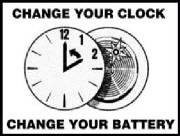|

And never forget to change the batteries! Even if your detectors
are primarily powered by electric, changing the batteries once every six months ensures they are always ready to work - even
during a power failure. We suggest changing them every time you adjust your clocks for daylight savings time (except
for you folks in Arizona!). Still need another reason to change your batteries regularly? Then consider this: many times,
an electrical fire will cause the main circuit breaker to trip, thereby cutting off AC power to the smoke detectors.
That's one reason why battery backups are so important.
Smoke
detectors. Think of them as an inexpensive life insurance policy and never be without them in your home.
My smoke alarms are hardwired with a battery backup. For some reason, half of them have no indicator light
on, but when I test them they all go off. What could be wrong?
Smoke detectors connected together will set each other off whether they
are operating on AC power or the backup battery.
If you have no indicator light glowing, then there might be a problem
with the AC power at that detector location and it may only be running on battery power. However, it will still work properly
(and notify the other detectors when tripped) until the battery runs dead. You should have a licensed electrician check for
AC power at the detector locations where the indicator light isn’t on.
I am trying to connect my home’s hard wired smoke detectors into my alarm system. Can you tell me how
I can do this?
The
quick answer is, you can’t. Hardwired AC smoke detectors are only designed to be interconnected with other AC smoke
detectors, and in this case, only detectors manufactured by the same company. Smoke detectors installed on a security or fire
alarm panel are low voltage DC devices (usually 12 or 24 volts DC) and are not able to be connected to the AC smoke detector
network in your house. In some cases, it is possible to purchase an interface device from the AC smoke
detector manufacturer that would allow you to connect them to your security or fire alarm panel, but it might be a better
move to have a licensed security company install more of the low voltage smoke detectors on your system instead. There may
be limiting factors in connecting your AC detectors to your alarm panel, even with an appropriate interface device.
Lastly, if you decide to add more
low voltage smokes, you might be tempted to remove your AC powered smoke detectors. Before doing so, you should check with
your local building inspector first. In some municipalities, AC powered smoke detectors are required to be installed in your
home, regardless of whether or not you have monitored fire protection as part of a home security system.
My smoke detector started chirping about once a minute. I changed my batteries but it didn’t stop. Why could
it be doing this?
Sometimes the low battery
beep takes a couple of hours to stop after changing the battery.
If this isn't the case, then make sure you used a battery
that was recommended by the manufacturer of the smoke detector, and that it was a brand-new never used battery.
If it’s
still beeping after this, then you might have a bad detector and you should consider replacing it.
Does the power need to be turned off to safely change the
backup battery in hard wired smoke detector?
Most smoke detectors have a battery compartment that isolates it from the 120 volt
connections in the detector to prevent the possibility of getting a shock, so you should be OK.
|

